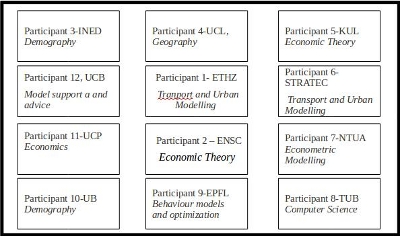
The goal of SustainCity is to address the modelling and computational issues of integrating modern mobility simulations with the latest micro-simulation land use models. The 6th Consortium Meeting in Lausanne showed once again that interdisciplinary research is challenging but necessary to be able to tackle the complex problems in regional development.
The task of the SustainCity project is to develop and test methods (i.e. discrete choice modelling and multi-agent simulation) and tools (i.e. UrbanSim and MATSim) for more sustainable urban planning. The focus lies on the interaction between transport and land use which appears for example when a new highway is built, which increases the accessibility of a certain region leading to higher property prices.
A consortium of twelve partners representing economy, transport planning, urbanism, geography, demography, computer science and mathematics is working together to cover the range of necessary skills from developing econometric models to interpreting results in an urban context. While the econometricians develop new models for capturing the decision making process of couples, geographers developed a method to make the results of case studies comparable. Computer scientists improve algorithms to be able to process the huge data involved in micro-simulation.
In the SustainCity project we see that interdisciplinary research is necessary and comes with challenges. The challenges start with the very basic but not negligible task of harmonising terminologies. Even in related fields, terms like accessibility are defined differently which resulted in this case in very fruitful discussions. Thus we experience that an important benefit of interdisciplinary research lies within the conjunction of otherwise isolated knowledge which stimulates innovation.
Ansprechpartner: Christof Zoellig